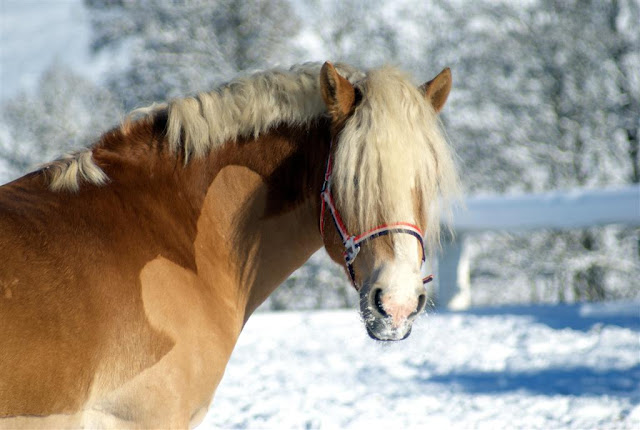Keeping Your Horse Happy And Healthy Over Winter
Thus, however long you’ve kept horses it’s always worth reminding oneself of the fundamentals of ensuring a happy and healthy horse over the winter months.

The importance of nutrition
Just like humans, horses need to be particularly well nourished in winter to maintain a healthy immune system that will fight infections and a layer of subcutaneous fat to stay warm. Unlike humans, however, they have evolved to spend around three quarters of their day eating. Thus, it’s vitally important that your horse is well fed with lots of forage all day and night. Your horse’s forage requirements are particularly important in the winter to compensate for the lack of pasture available in the colder months. Not only must they have enough hay to give them adequate dietary fibre but the act of consuming and digesting the forage will help to keep your horse warm. You should also compensate for the lack of grass with a vitamin and mineral supplement such as brewers yeast for horses. Finding the balance in your horse’s hard feed may be tricky. Try not to overcompensate for the season as this can cause your horse to become overweight which will create more problems than it solves. By rule of thumb your horse should consume 2.5% of their body weight per day. You should also ensure that they have access to plenty of fresh water and ensure that their water supply does not freeze over.
Don’t let the winter blues turn to neglect
Around this time of year, few of us have the energy to get out of bed on a freezing pitch black morning, but don’t let your winter blues lead you to neglect your noble steed. As horrible as it may be to crawl out of a comfy warm bed, your daily health checks are hugely important all year round.
The exercise balance
Just like us, horses need to keep up their exercise to stay in shape and keep their immune systems at peak efficiency in winter. Make sure that you make efforts to ride your horse as normal and even take them longeing where possible. If the weather gets so bad that riding is dangerous or even impossible, give them free range time in a large paddock.
And finally… Keep up the hoof care!
Any farrier will tell you that hoof care is an all-year-round deal. Whether your horse is barefoot or shod or regardless of how much they are ridden they still need a farrier’s attention every 6-8 weeks.
Labels:
Tips











Keeping your horse happy and healthy over winter requires proper care and attention. While they thrive outdoors, providing adequate shelter, quality forage, and fresh water is essential. A well-fitted blanket can offer extra warmth when needed, and regular exercise keeps them in good shape. Monitoring their weight and hooves is also crucial during colder months. With the right care, your horse can stay comfortable, happy, and strong throughout the winter season.
ReplyDeleteLong Hair German Shepherd Puppies for Sale
Great tips for winter horse care! I’ve found cozy stable upgrades and Promotional Homeware items like heated buckets and draft-proofing essentials really help. Keeping horses warm, well-fed, and stress-free makes a huge difference in their health and happiness.
ReplyDeleteMotorcycle Safety Awareness Month 2025 by The Aim Insurance focuses on promoting safe riding habits and raising awareness about motorcycle risks. It encourages riders and drivers alike to stay alert, wear proper gear, and follow traffic rules. This initiative aims to reduce accidents and protect lives on the road.
ReplyDeleteCanadian motorcycle insurance
Finding a good DUI Lawyer Kansas Cityy can make all the difference. KC Defense Counsel knows how to fight DUI charges smartly and aggressively. They helped a friend of mine avoid a conviction and keep his license. Definitely recommend reaching out fast if you’re in trouble—don’t risk going it alone.
ReplyDeleteGreat tips! Winter care is so important—my horse struggled last year, but rugs and a proper feeding routine made a difference. While planning o que fazer em Lisboa this winter, I’ll make sure my stable routine stays strong. Thanks for keeping it clear and practical!
ReplyDeleteGreat winter care tips! Keeping horses warm, well-fed, and active is crucial during the cold months. At Akala Residences, we've found cozy, dry shelters and consistent routines really help maintain their health and happiness. Thanks for the solid advice—it aligns perfectly with our approach!
ReplyDeleteGreat winter care tips! Just like planning stables at Wynwood Dubai Islands considers climate and comfort, it’s essential to ensure horses stay warm, well-fed, and exercised. Blanketing, hydration, and hoof care make a huge difference. Loved how practical and horse-focused this post was!
ReplyDeleteGreat tips! Keeping horses warm and well-fed in winter really matters. I also winter-proof my barn using coatings from industrial paint shops near me—helps with insulation and cleanliness. Your post reminded me how small efforts go a long way in keeping horses healthy and happy year-round!
ReplyDelete